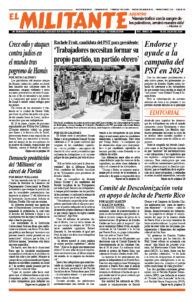MONTREAL — Some 680 mechanics and maintenance workers at WestJet, Canada’s second-largest airline, went on strike June 28, despite a federal government order seeking to force them into compulsory binding arbitration. The workers are fighting for their first union contract as members of the Aircraft Mechanics Fraternal Association.
The strike began on the three-day July 1 Canada Day holiday weekend. Hundreds of flights were cancelled.
Picketing at Toronto Pearson International Airport’s Terminal 3 June 29, Sean McVeigh, a WestJet maintenance engineer, told the Canadian Press that they had to strike to force WestJet bosses to return to “respectful negotiation.” He said the strikers are asking for better working conditions and a “fair and respectful wage.”
“Safety in the air begins with quality maintenance on the ground” is AMFA’s slogan.
Saying it didn’t meet their needs, workers voted down a tentative agreement between WestJet bosses and union officials in mid-June by 97.5%. Since then, WestJet bosses have refused to negotiate seriously, offering a paltry 1% wage increase over an extended contract. A mandatory 72-hour strike notice handed in by the union June 27 was immediately followed by a 72-hour lockout notice by bosses.
To prevent the strike, Liberal government Labor Minister Seamus O’Regan — under a clause in the Canada Labor Code that gives federal officials the power to “maintain industrial peace” — ordered the Canada Industrial Relations Board June 27 to forbid a strike and force the workers into compulsory arbitration.
The board, supposedly an independent body that deals with disputes that fall under the federal labor code, governs workers in air, rail transportation and in Canada’s ports.
This time the board didn’t do Ottawa’s bidding. It ruled that Ottawa’s compulsory arbitration order didn’t have the “effect of suspending the right to strike or lockout.” On this basis, Aircraft Mechanics Fraternal Association officials called the strike.
WestJet bosses charge the strike was illegal. Company CEO Alexis von Hoensbroech blamed the strike on a “rogue union from the U.S. that was trying to make inroads into Canada.” They threatened to fire workers who join the picket lines.
A victory by the WestJet mechanics would register a blow to the federal government’s use of anti-labor boards and strike bans against Machinists, rail workers and others who move freight and passengers.
A tentative agreement was reached June 30. It’s front-loaded with a 15.5% raise in the first year, and if it’s voted down binding arbitration is imposed.


